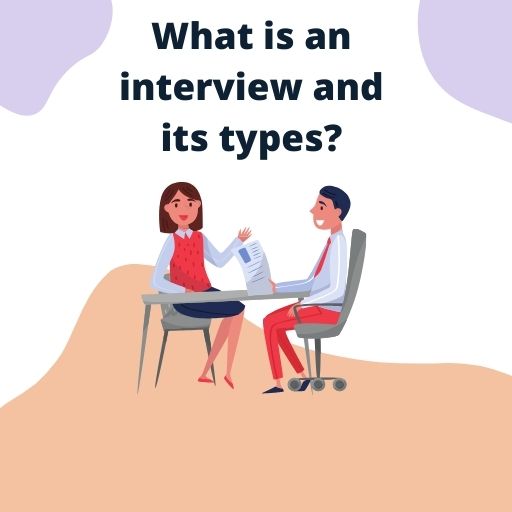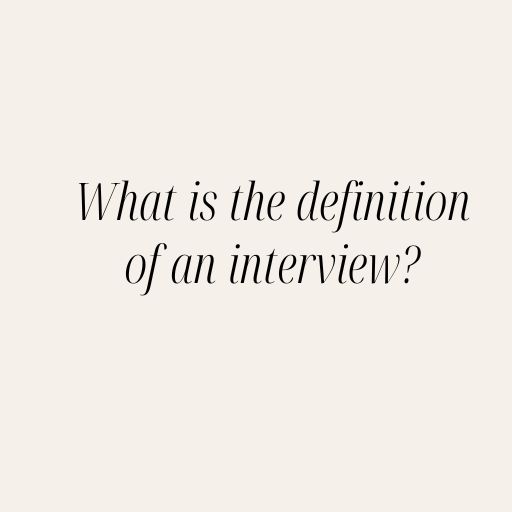An interview is a formal meeting who happens to gather information, generally between a researcher and a subject or between an employer and a candidate for a job. Its goal is to assess an applicant’s history capacities, experience, and personality to try to assess on whether they’d be a good fit for the position or to get relevant details for further study.
There are numerous kinds of interviews, like this one:
Interviews which are traditional: or structured feature the interviewer providing an organized list of questions to assess the candidate’s skills and qualifications.
Behavioral Interviews: In this type of interview, the interviewer asks questions to determine the candidate’s response to specific events and focuses on the candidate’s past behavior.
Panel Interviews: To determine a candidate’s compatibility with the rest of the team, a group of interviewers from different parts or levels of the company holds the interview collectively.
Telephone/Video Interviews: These interviews are held over the phone via video conferencing devices. Before an in-person meeting, they tend to be used as first screening stages.
Case Interviews: Commonly applied in the consulting and analytics fields, case interviews include putting an unreal company scenario to a candidate to evaluate their ability to analyze and resolve issues.
Group interviews: a handful of applications are interviewed all at once so the interviewer has access to their abilities to communicate and function as a team.
Technical interviews: Created specifically for technical roles, these interviews check a candidate’s technical problem-solving abilities, knowledge, and capabilities.
What are the two main types of interviews?

Structured Interviews: These interviews have an established format and feature a set of questions that are asked to individuals in an ordered manner. The candidate’s passwords, talents, and experience are frequently part of the concerns. The evaluation of candidates could be uniformly and reliably done with the utilization of structured interviews.
Unstructured Interviews: Unstructured interviews are more conversational and casual than structured interviews. The questions asked are often open-ended and can differ for each candidate. Unstructured interviews provide the interviewer with more liberty to go further into the candidate’s answers and consider various facets of their past and their eligibility for this position.
What is the aim of interview?

The goal of an interview is to obtain more about a candidate and evaluate their personality, origins, capacities, and skills in order to decide if they’d be suitable for the role. It offers the interviewer to assess the candidate’s suitability for this position, ability to thrive well in the group, and willingness to support the company’s goals.
Interviews can be used to obtain helpful data for future study. Here, interviews serve as a method of gathering data for academic or professional studies or as a manner to gather insights, viewpoints, and information from participants to try learn about a subject matter deeper.
In broad terms, the objective of an interview is to determine whether a candidate is a good fit for the position or to obtain appropriate information for further study.
What is the definition of an interview?

An interview is a formal, structured chat or meeting between an interviewee (particularly in a job chance or research participant) and an interviewer (frequently an employer or researcher). It occurs out so as to obtain data, appraise information, skills, knowledge, or views, and make defensible choices or conclusions form the discussion. In an interview, questions typically put by the interviewer to the interviewee, who later reacts. This allows for the exchange of information and a conversation on topics related to the interview’s objectives.
انٹرویو کیا ہے اور اس کی اقسام؟
انٹرویو ایک باضابطہ میٹنگ ہے جو معلومات اکٹھی کرنے کے لیے ہوتی ہے، عام طور پر ایک محقق اور موضوع کے درمیان یا کسی آجر اور نوکری کے امیدوار کے درمیان۔ اس کا مقصد درخواست دہندگان کی تاریخ کی صلاحیتوں، تجربے اور شخصیت کا جائزہ لینا ہے تاکہ یہ اندازہ لگانے کی کوشش کی جا سکے کہ آیا وہ اس عہدے کے لیے موزوں ہیں یا مزید مطالعہ کے لیے متعلقہ تفصیلات حاصل کرنا۔
انٹرویو کی بہت سی قسمیں ہیں، جیسے کہ:
انٹرویوز جو روایتی یا ساختی ہوتے ہیں ان میں انٹرویو لینے والا امیدوار کی مہارت اور قابلیت کا اندازہ لگانے کے لیے سوالات کی ایک منظم فہرست فراہم کرتا ہے۔
رویے سے متعلق انٹرویو: اس قسم کے انٹرویو میں، انٹرویو لینے والا مخصوص واقعات پر امیدوار کے ردعمل کا تعین کرنے کے لیے سوالات پوچھتا ہے اور امیدوار کے ماضی کے رویے پر توجہ مرکوز کرتا ہے۔
پینل انٹرویوز: باقی ٹیم کے ساتھ امیدوار کی مطابقت کا تعین کرنے کے لیے، کمپنی کے مختلف حصوں یا سطحوں سے انٹرویو لینے والوں کا ایک گروپ اجتماعی طور پر انٹرویو کا انعقاد کرتا ہے۔
ٹیلی فون/ویڈیو انٹرویوز: یہ انٹرویوز ویڈیو کانفرنسنگ ڈیوائسز کے ذریعے فون پر ہوتے ہیں۔ ذاتی ملاقات سے پہلے، وہ پہلے اسکریننگ کے مراحل کے طور پر استعمال ہوتے ہیں۔
کیس انٹرویوز: عام طور پر مشاورت اور تجزیاتی شعبوں میں لاگو ہوتے ہیں، کیس انٹرویوز میں کسی امیدوار کے سامنے غیر حقیقی کمپنی کا منظر پیش کرنا شامل ہے تاکہ وہ مسائل کا تجزیہ کرنے اور حل کرنے کی صلاحیت کا جائزہ لے سکے۔
گروپ انٹرویوز: مٹھی بھر درخواستوں کا ایک ساتھ انٹرویو کیا جاتا ہے تاکہ انٹرویو لینے والے کو ایک ٹیم کے طور پر بات چیت کرنے اور کام کرنے کی اپنی صلاحیتوں تک رسائی حاصل ہو۔
تکنیکی انٹرویوز: خاص طور پر تکنیکی کرداروں کے لیے بنائے گئے، یہ انٹرویو امیدوار کی تکنیکی مسئلہ حل کرنے کی صلاحیتوں، علم اور صلاحیتوں کو جانچتے ہیں
انٹرویو کی دو اہم اقسام کیا ہیں؟
سٹرکچرڈ انٹرویوز: ان انٹرویوز کا ایک قائم شدہ فارمیٹ ہوتا ہے اور ان میں سوالات کا ایک مجموعہ ہوتا ہے جو افراد سے ترتیب وار انداز میں پوچھے جاتے ہیں۔ امیدوار کے پاس ورڈ، ہنر اور تجربہ اکثر خدشات کا حصہ ہوتے ہیں۔ امیدواروں کی تشخیص یکساں اور قابل اعتماد طریقے سے ترتیب شدہ انٹرویوز کے استعمال سے کی جا سکتی ہے۔
غیر ساختہ انٹرویوز: غیر ساختہ انٹرویوز سٹرکچرڈ انٹرویوز سے زیادہ بات چیت اور آرام دہ ہوتے ہیں۔ پوچھے گئے سوالات اکثر کھلے ہوتے ہیں اور ہر امیدوار کے لیے مختلف ہو سکتے ہیں۔ غیر منظم انٹرویو انٹرویو لینے والے کو امیدوار کے جوابات میں مزید جانے اور ان کے ماضی کے مختلف پہلوؤں اور اس عہدے کے لیے ان کی اہلیت پر غور کرنے کے لیے مزید آزادی فراہم کرتے ہیں۔
انٹرویو کا مقصد کیا ہے؟
انٹرویو کا مقصد امیدوار کے بارے میں مزید معلومات حاصل کرنا اور ان کی شخصیت، اصلیت، صلاحیتوں اور مہارتوں کا جائزہ لینا ہے تاکہ یہ فیصلہ کیا جا سکے کہ آیا وہ اس کردار کے لیے موزوں ہیں یا نہیں۔ یہ انٹرویو لینے والے کو اس پوزیشن کے لیے امیدوار کی مناسبیت، گروپ میں اچھی طرح ترقی کرنے کی صلاحیت، اور کمپنی کے اہداف کی حمایت کرنے کی خواہش کا جائزہ لینے کی پیشکش کرتا ہے۔
مستقبل کے مطالعے کے لیے مفید ڈیٹا حاصل کرنے کے لیے انٹرویوز کا استعمال کیا جا سکتا ہے۔ یہاں، انٹرویوز اکیڈمک یا پروفیشنل اسٹڈیز کے لیے ڈیٹا اکٹھا کرنے یا کسی موضوع کے بارے میں گہرائی سے جاننے کی کوشش کرنے کے لیے شرکاء سے بصیرت، نقطہ نظر اور معلومات اکٹھا کرنے کے طریقے کے طور پر کام کرتے ہیں۔
وسیع اصطلاحات میں، انٹرویو کا مقصد یہ طے کرنا ہے کہ آیا کوئی امیدوار اس پوزیشن کے لیے موزوں ہے یا مزید مطالعہ کے لیے مناسب معلومات حاصل کرنا ہے
انٹرویو کی تعریف کیا ہے؟
انٹرویو ایک انٹرویو لینے والے (خاص طور پر ملازمت کے مواقع یا تحقیق میں شریک) اور ایک انٹرویو لینے والے (اکثر ایک آجر یا محقق) کے درمیان ایک رسمی، منظم چیٹ یا ملاقات ہے۔ یہ اعداد و شمار حاصل کرنے، معلومات، مہارت، علم، یا خیالات کا اندازہ لگانے، اور قابل دفاع انتخاب یا نتیجہ اخذ کرنے کے لیے ہوتا ہے۔ ایک انٹرویو میں، عام طور پر انٹرویو لینے والے کی طرف سے انٹرویو لینے والے سے سوالات کیے جاتے ہیں، جو بعد میں ردعمل ظاہر کرتا ہے۔ یہ معلومات کے تبادلے اور انٹرویو کے مقاصد سے متعلق موضوعات پر گفتگو کی اجازت دیتا ہے۔


